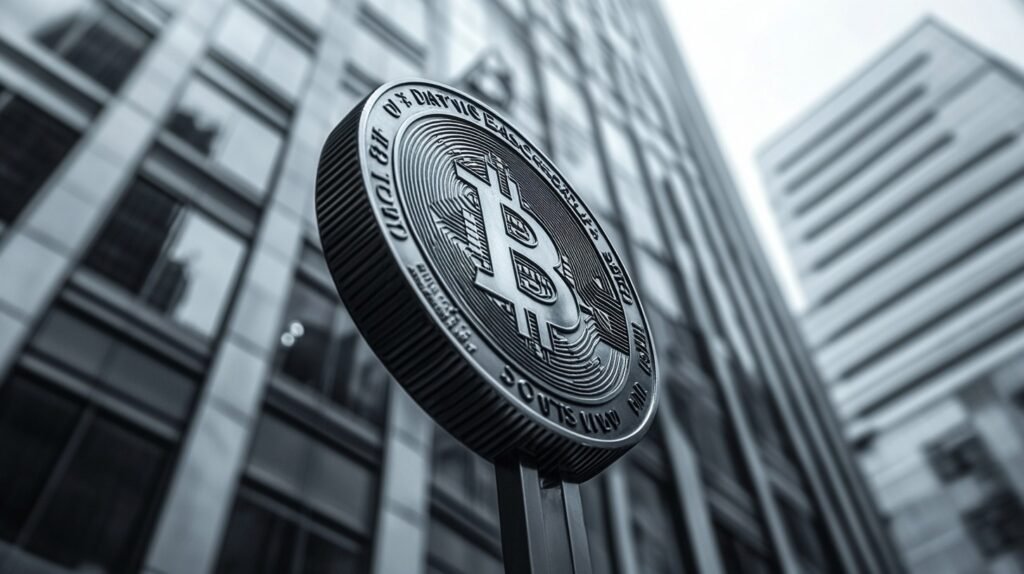Crypto & Finance
SEC shocks crypto world as Grayscale wins approval for first-ever US multi-asset ETP… here’s what it includes
The SEC clears Grayscale’s Digital Large Cap Fund, giving investors exposure to Bitcoin, Ether, XRP, Solana, and Cardano under new listing rules.

In a landmark decision for digital finance, the U.S. Securities and Exchange Commission (SEC) has approved the nation’s first-ever multi-asset cryptocurrency exchange-traded product (ETP). The product, known as the Grayscale Digital Large Cap Fund (GDLC), will offer investors direct exposure to five of the largest cryptocurrencies: Bitcoin, Ethereum, XRP, Solana, and Cardano.
ALSO READ : Donald Trump rethinks CFTC pick after Winklevoss twins derail Brian Quintenz nomination… here’s who could replace him
The approval, disclosed Wednesday in a regulatory filing, follows the massive success of U.S. spot Bitcoin ETFs, and is being hailed as a milestone moment for crypto adoption on Wall Street.
Why this matters for investors
Unlike buying tokens directly through exchanges, a multi-asset crypto ETP allows investors to gain diversified exposure to digital assets through traditional brokerage accounts. It’s a gateway for institutions and retail investors alike who may be hesitant to navigate wallets, private keys, and unregulated crypto platforms.
Industry watchers say the timing is telling. The approval came as excitement grows around the prospect of an “altcoin season” — a period when smaller cryptocurrencies often outperform Bitcoin. On August 15, Coinbase Institutional’s global head of research, David Duong, predicted that a full-scale altcoin rally could kick off in September, citing historical patterns.

Grayscale celebrates regulatory breakthrough
Grayscale CEO Peter Mintzberg announced the approval on X, writing:
Grayscale Digital Large Cap Fund $GDLC was just approved for trading along with the Generic Listing Standards. The team is working expeditiously to bring the FIRST multi-crypto asset ETP to market with Bitcoin, Ethereum, XRP, Solana, and Cardano.
He also thanked the SEC Crypto Task Force for what he described as “unmatched efforts in bringing the regulatory clarity our industry deserves.”
A shift in the SEC’s approach
The SEC approved Grayscale’s product under new generic listing standards, which streamline the process for crypto ETFs on exchanges like Nasdaq, NYSE Arca, and Cboe BZX. Instead of assessing every application from scratch, the Commission can now fast-track similar products.
The change reflects a broader pivot inside the SEC since the appointment of acting Chair Mark Uyeda and the leadership of Commissioner Hester Peirce, nicknamed “Crypto Mom” for her industry-friendly stance.
The creation of the Crypto Task Force in January 2025 signaled a break from the enforcement-heavy era under former chair Gary Gensler, who oversaw lawsuits against Ripple Labs, Terraform Labs, and major exchanges including Binance, Coinbase, and Kraken. Those cases dragged on for years, costing the industry billions in legal fees and stifling innovation.
What comes next
For many in the digital asset space, the SEC’s approval is more than a green light for Grayscale — it’s a signal that Washington is finally beginning to embrace crypto innovation rather than simply police it.
“This could be the first domino,” one analyst noted. “If Grayscale can bring a diversified product to market, we’ll likely see a wave of new ETPs tracking baskets of tokens, not just Bitcoin.”
With traditional investors now able to access altcoins alongside Bitcoin in a single product, industry leaders believe the U.S. has taken a crucial step toward mainstream adoption. For traders hoping for an altcoin boom this fall, the timing couldn’t be better.
Crypto & Finance
Metaplanet shocks markets with $600M Bitcoin buy becoming world’s 4th-largest corporate holder…
The Tokyo-listed firm now holds over 30,800 BTC worth $3.6 billion, surpassing rivals in the corporate Bitcoin treasury race.

In a move that cements its status as one of the most aggressive corporate buyers of cryptocurrency, Japanese investment company Metaplanet has acquired an additional 5,268 Bitcoin — a purchase worth nearly $600 million at current market prices.
The company’s announcement on Wednesday confirmed its total Bitcoin holdings now stand at 30,823 BTC, propelling the Tokyo-listed firm into the fourth spot among corporate Bitcoin holders, according to BitcoinTreasuries.NET. Metaplanet’s haul places it ahead of the Bitcoin Standard Treasury Company and behind only three giants: MicroStrategy, Marathon Digital, and Tesla.
ALSO READ : Taylor Swift credits George Michael on The Life of a Showgirl and some fans ask… Who is he?
The latest purchase was made at an average price of 17.39 million Japanese yen (approximately $116,000) per coin. In total, Metaplanet’s Bitcoin treasury is now worth $3.6 billion, with an average acquisition cost of about $108,000 per coin. According to data, the strategy has already generated an unrealized profit of 7.5%.
Metaplanet’s Bitcoin yield skyrocketed in 2024
Metaplanet began adding Bitcoin to its balance sheet in April 2024, and its pace of accumulation has stunned analysts.
By late 2024, the company’s BTC Yield — a metric tracking the ratio of total Bitcoin holdings to fully diluted shares — soared to 309.8%, meaning investors saw per-share Bitcoin exposure more than triple in a matter of months.
While that blistering pace has cooled, the metric remains steady at 33% in 2025, indicating the firm’s Bitcoin strategy continues, albeit at a more sustainable level.

“A 309% BTC Yield shows that Metaplanet’s accumulation speed far outpaced its share dilution,” one industry analyst noted. “Even with the stabilization, the company has positioned itself as a dominant crypto-treasury player.”
Public companies now hold 1 million Bitcoin
According to BitcoinTreasuries.NET, public companies collectively hold over 1 million BTC, worth approximately $116 billion — about 4.7% of the total circulating supply.
The broader landscape of treasuries is even more striking. Across ETFs, governments, exchanges, and private companies, 3.8 million BTC are held in treasuries worldwide, a stash worth around $442 billion.
Altcoin treasuries are also gaining momentum. Data from the Strategic ETH Reserve shows that Ether-based treasuries, including ETFs and reserve entities, now hold 12.14 million ETH, valued at $52 billion. Meanwhile, the Strategic SOL Reserve reports 20.92 million Solana (SOL) in treasuries, worth about $4.55 billion.
A bold bet on digital assets
Metaplanet’s aggressive strategy mirrors that of Michael Saylor’s MicroStrategy, which famously transformed itself into a Bitcoin treasury giant. With its latest acquisition, Metaplanet has not only sent a clear signal to Asian markets but also underscored the growing trend of corporations treating Bitcoin as a reserve asset rather than a speculative gamble.
For investors, the message is clear: while volatile, Bitcoin is no longer a fringe experiment. It is becoming a corporate asset class — and Metaplanet has just placed itself firmly in the global spotlight.
Crypto & Finance
US government shutdown sparks Bitcoin surge and analysts hint crypto market bottom may be near…
As Washington faces its first shutdown since 2018, Bitcoin climbs above $116,000 and experts say altcoins could already be at their lowest point.

The United States government entered its first shutdown in six years this week, and while political gridlock is rattling Washington, the cryptocurrency market may be finding its footing.
According to data shared by Cointelegraph, Bitcoin rose 2.9% in the past 24 hours, trading at $116,427 at the time of writing. Gold prices also jumped 0.7%, underscoring growing demand for so-called safe-haven assets amid economic uncertainty.
ALSO READ : Nicole Kidman files for divorce from Keith Urban after 19 years fans shocked by sudden split
The shutdown — the first since the record-breaking 35-day closure in late 2018 — stems from partisan divisions in Congress. Republicans pushed forward a temporary funding measure, or continuing resolution (CR), without adopting policy changes requested by Democrats. Led by Senator Chuck Schumer, Democrats insisted on including a permanent extension of Affordable Care Act tax credits to prevent millions from losing healthcare coverage.
Shutdowns and crypto: a mixed history
This latest closure has renewed debate over how shutdowns affect global markets. In 2013, equities fell while Bitcoin surged. But in 2019, both stocks and Bitcoin valuations declined. As macro research firm Milk Road Macro noted in an X post this week: “Shutdowns always disrupt the flow of government, but the market’s reaction is never uniform.”

For investors, the uncertainty often drives capital toward assets perceived as immune to political instability — a role that Bitcoin, and increasingly other cryptocurrencies, appear to be filling.
Analysts eye a crypto market bottom
Ryan Lee, chief analyst at crypto exchange Bitget, believes this shutdown could mark a turning point.
“Bitcoin is bound to also benefit from this shutdown, as its immunity to government and political uncertainties will make it attractive to mainstream traditional investors,” Lee told Cointelegraph. “While corrections are likely along the way, most promising altcoins in the market appear to have bottomed out.”
Lee added that Bitcoin reclaiming the $116,000 level is a “positive sign for the wider crypto market,” especially heading into October — historically one of the strongest months for digital assets.
Interest rates and investor sentiment
Beyond political theater, the market is also watching for a potential shift in US interest rate policy. Analysts suggest the shutdown could lead to reduced pressure on the Federal Reserve to raise rates further, which would favor both equities and crypto.
If the Fed slows down its tightening cycle, Bitcoin and altcoins could benefit from an influx of capital seeking growth opportunities outside traditional banking.
A fragile balance
Still, risks remain. Government shutdowns disrupt federal services, delay economic data releases, and inject volatility into already fragile markets. While Bitcoin’s rally may suggest optimism, analysts caution that sentiment can shift quickly, particularly if the shutdown drags on.
For now, the crypto community is eyeing October closely. If historical patterns hold, this month could set the tone for the rest of 2025, potentially turning a political standoff into an unlikely catalyst for the digital asset market.
Crypto & Finance
Bank of England chief says stablecoins could reshape UK banking system but warns of hidden risks…
Andrew Bailey signals openness to stablecoins for payments and settlements, while urging caution on their risks and impact on commercial banks.

The debate over stablecoins and their role in the future of finance has taken a sharp turn in the United Kingdom. Andrew Bailey, Governor of the Bank of England, has suggested that stablecoins could eventually reduce the country’s reliance on traditional commercial banks, opening the door for a system where money and credit are more clearly separated.
In a column for the Financial Times, Bailey acknowledged that the current system of fractional reserve banking—where banks keep a fraction of deposits in reserve and lend out the rest—creates inherent risks. “Most of the assets backing commercial bank money are not risk-free: they are loans to individuals and to companies,” Bailey wrote. “The system does not have to be organised like this.”
ALSO READ : Dutch firm Amdax raises $23M to chase 1% of Bitcoin supply what it means for global markets
Separating money from credit
Bailey floated the idea of a framework where stablecoins and banks could coexist, but with credit provision shifting more heavily to non-bank institutions. In his view, such a change could strengthen financial stability by separating money creation from lending activity.
Still, Bailey stressed the need for caution, warning that “it is important to consider the implications of such a change thoroughly before going ahead.”
Industry pushback over caps
Bailey’s comments come amid criticism of the BoE’s earlier proposal to impose caps on individual stablecoin holdings, a move industry groups said would be costly and burdensome.

Tom Duff Gordon, Vice President of International Policy at Coinbase, argued that “no other major jurisdiction has deemed it necessary to impose caps.” Advocacy groups warn that such restrictions could push innovation elsewhere, leaving the UK trailing behind markets in the European Union and the United States.
Bailey, however, clarified that his focus is on the mass adoption of stablecoins for payments and settlements rather than their speculative use as investment assets.
Central bank accounts for stablecoins?
In one of the most striking proposals, Bailey said that widely used UK-based stablecoins should be allowed to hold accounts at the Bank of England. Such access, he explained, would reinforce their credibility as money while ensuring that the system remains stable.
This approach appears to reflect a middle ground: while Bailey has previously warned against banks issuing their own stablecoins, central bank access could act as a safeguard against systemic risks while encouraging innovation in tokenized finance.
Risks still remain
Despite his measured optimism, Bailey emphasized that stablecoins are not without flaws. He noted that their backing assets must be truly risk-free, unlike the lending-heavy balance sheets of commercial banks. He also flagged the need for insurance against operational risks such as hacks, as well as standardized rules for exchange.
“It should also be possible to have innovation in the form of money,” Bailey said. “It would therefore be wrong to be against stablecoins.”
What this means for the UK
Bailey’s remarks mark a notable shift from earlier skepticism within the BoE. They also come at a time when governments worldwide are grappling with how to regulate stablecoins while maintaining financial stability.
The BoE is set to publish a consultation paper in the coming months on its systemic stablecoin regime, which will outline the rules for digital assets intended for use in everyday payments or for settling tokenized financial markets.
If implemented, Bailey’s vision could fundamentally reshape the UK’s financial landscape—offering innovation in payments while challenging the centuries-old dominance of commercial banks in money creation.
For now, the future of stablecoins in Britain hangs in the balance, with regulators, banks, and crypto firms all waiting to see whether the central bank will fully embrace this digital revolution or keep it on a tight leash.
-

 US News1 week ago
US News1 week ago“She Never Made It Out…” Albany House Fire Claims Woman’s Life as Family Pleads for Help to Bring Her Home
-

 Entertainment6 days ago
Entertainment6 days agoXG Star Cocona Shares a Brave Truth at 20 — “I Was Born Female, But That Label Never Represented Who I Truly Am…”
-

 Entertainment6 days ago
Entertainment6 days agoSamba Schutte Reveals the Surprise Cameo in Pluribus That “Nobody Saw Coming”… and Why John Cena Was Perfect for the Role
-

 Entertainment1 week ago
Entertainment1 week agoNika & Madison stuns global audiences as director Eva Thomas reveals why “resilience, not fear, drives Indigenous women on the run”
-

 Tech1 week ago
Tech1 week agoAfter Losing Over $70 Billion, Mark Zuckerberg Finally Admits His Biggest Bet Is “Not Working” – Meta Plans Massive Cuts to Metaverse Budget
-

 Sports5 days ago
Sports5 days agoDodgers Stun MLB With Blockbuster Move, Sign Elite Closer Edwin Díaz to Three-Year, $69 Million Deal
-

 Entertainment4 days ago
Entertainment4 days agoTeyana Taylor wakes up to a Golden Globe call at 5 a.m.… ‘Am I dreaming right now?’ — and why she’s already begging Paul Thomas Anderson for more
-

 Politics5 days ago
Politics5 days ago“Billions and Billions Have Watched Them…” Trump Makes History Hosting Kennedy Center Honors and Praising Stallone, Kiss, and More





























Pingback: Vietnam shuts down 86 million bank accounts over biometrics… Bitcoin advocates say “this is why we Bitcoin” - Daily Global Diary - Authentic Global News